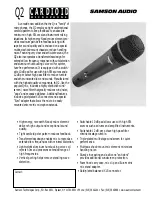
6
INTRODUCTION
Thank
you
for
choosing
this
PROEL
product
and
for
your
trust
in
our
brand,
synonymous
of
professionalism,
accuracy,
high
quality
and
reliability.
All
our
products
are
CE
approved
and
designed
for
continuous
use
in
professional
systems.
DESCRIPTION
The
WM202
Wireless
Microphones
series
is
a
UHF,
quartz
controlled,
fixed
frequency
device,
which
provides
a
reliable,
high
quality
signal
transmission.
WM202
Wireless
Microphone
system
features
3
units:
WM202
receiver,
WM2M
handheld
transmitter
and
WM2H
body
pack
transmitter.
The
system
is
available
in
three
different
configurations,
each
of
them
including
an
ABS
carrying
case:
WM202M
:
WM202
+
WM2M
WM202H
:
WM202
+
WM2H
+
lavalier
+
headset
WM202KIT
:
WM202
+
WM2M
+
WM2H
+
lavalier
+
headset
Four
factory
pre
‐
build
frequencies
are
available,
which
have
been
accurately
selected
to
allow
the
simultaneous
use
of
4
devices
without
interference
between
them:
1.
863.100
MHz
2.
863.900
MHz
3.
864.500
MHz
4.
864.900
MHz
WM202
RECEIVER
See
FIG.
1
at
page
15:
1.
DC
IN
Socket
for
the
AC/DC
adaptor
connection,
use
only
the
adaptor
supplied
with
the
system.
2.
OUTPUT
(UNBALANCED)
Unbalanced
audio
output
with
line
level:
connect
it
through
a
mono
6.3mm
jack
cable
to
a
mixer
input.
3.
OUTPUT
(BALANCED)
Balanced
audio
output
with
mic
level:
connect
it
through
a
XLR
cable
to
a
mixer
input.
4.
POWER
On/off
switch.
5.
ON
Red
LED:
if
lighted
states
that
the
power
supply
is
present
and
the
receiver
is
turned
on.
6.
RF
Green
LED:
if
lighted
states
that
the
transmitter
is
sending
a
radio
signal
to
the
receiver.
7.
AF
Red
LED:
illuminates
when
an
audio
signal
is
present.
8.
VOLUME
Volume
potentiometer:
set
this
control
to
a
proper
level
that
doesn’t
saturate
the
mixer
input
channel.
9.
ANTENNA
These
are
the
receiving
antennas.
Raise
them
up
during
the
use
and,
to
obtain
a
better
reception,
place
the
receiver
away
from
other
metal
objects
and
no
more
distant
than
30m
from
the
transmitter.
10.
RECEIVING
FREQUENCY
In
this
label,
together
with
the
general
data
of
the
receiver,
you
can
find
the
receiving
radio
frequency.
In
case
of
use
of
more
radio
apparatus
it
must
correspond
to
the
frequency
of
the
wireless
transmitter







































